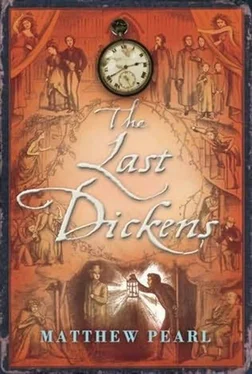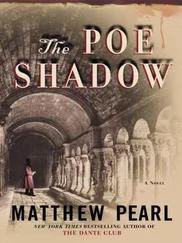“You must escape,” said a young Englishman who had taken a particular interest in the singular Parsee boy. “They will kill you and cut off your head if you don't! We will help if you take us with you, Herman.” The British and American prisoners had called him Herman, their best approximation of his Parsee name.
Realizing that there would be consequences for his murder of the pirate, Hormazd stiffened and nodded. “Please help,” he said.
“Nah, don't count me in,” said a Scotch prisoner. “I won't risk my hide because of this fire worshipper's heathen impulses! A fellow who refuses even to smoke, and with that Hindoo wrap on his head!”
Hormazd took a step toward the Scotchman. The English prisoner stepped between them. “Would you like to fight him?” he asked the Scotch sailor, who demurred. “The man you see is neither a Hindoo nor a Mohammedan,” the Englishman went on, “but a Parsee, a follower of Zoroaster and an ally of British power in India. Respect him, my friend, and we will help each other.”
Rolling the body of the murdered pirate into the water, Hormazd and the European captives were able to procure a small arsenal of weapons from the lorchas stores without being observed and then slipped into an open whaleboat. Before long, they had been spotted by the pirates’ lookout aboard the lorcha and were fired upon with grapeshot. Lying down flat in the boat, Hormazd used a rifle to kill more than half of the twenty pirates on the deck.
Hormazd insisted on turning back to reboard the lorcha.
“Insanity! We have a clear path to escape!” the Scotchman in the whaleboat protested. “We're almost out of ammunition.”
“We have enough,” Hormazd said flatly. “In ancient times, my people were driven from our land. In battle we scatter the heads of our foes-no Parsee ever turns his back though a millstone were dashed at his head.” Several of the pirates who'd escaped his fire because they were belowdeck, he said, had been responsible for the slaughter of his family and shipmates, and he would not leave them to prosper. Hormazd alone climbed up the netting on the side of the lorcha. After a quarter of an hour, Hormazd returned holding the head of one of the pirates. On the shore, he placed the head on a stake facing the water for Ah'ling to find. Then he strapped the body of a Chinese pirate to each yardarm, and Hormazd and the Englishman piloted the lorcha away.
When they reached Canton, they were congratulated by a chief mandarin on disabling one of the most nefarious pirate crews terrorizing innocent fishermen and traders. The men were showered by the mandarin with drink, jewels, and silver. On their way through the streets of Canton to the English settlement, a thief tried to take Hormazd's booty by smashing him across the head with a steel bar. Hormazd did not even flinch or turn around. Instead, he grasped the bar and flung the man to the ground, breaking the thief's arm in two places.
This was witnessed by many of the locals, who whispered of it, and from that day forward began to speak of a ghostly figure from foreign lands they called Ironhead.
The thief, who had fled by foot, dropped a bag filled with riches he'd plundered from other victims. Among these was a pure gold idol, a head of a Kylin with onyx for eyes-the Kylin, a mythological single-horned beast believed to bring good fortune and punish wicked men with fire and destruction. When it walked on land it left behind no footprints; when it walked on water it caused no ripple. Hormazd knew none of this then but, regardless, was drawn to it the empathetic way an ordinary man might be drawn to a starving dog. At the English settlement he paid to have the Kylin head to be attached to a walking stick and kept it with him when he sailed to London from Canton.
With his new riches and his great fortitude, Hormazd, it was said, began to build his own London-based opium-smuggling business. Ships would procure opium taken from India, away from the official channels of the colonial government, which was strictly controlled by the English, and smuggle the drug into English and American ports without the burden of tariffs and inspection for adulteration. However, the Englishman who had been a captive with Hormazd among the pirates and had helped him to escape soon unwittingly discovered some of the secrets of his operations.
“Who was this Englishman?” Osgood interrupted the teller urgently.
“A son of Han,” said Yahee. “Young man, name Edward Trood.”
“What do you mean, a son of Han?” Tom asked.
Yahee explained that Eddie Trood was a quick-witted though reserved young man who had learned Chinese so well in his travels that he had been kept alive by the pirates to do translations. He was called a son of Han, as if he were a Chinaman himself, by the natives, and a true rarity, for the Chinese government had banned the teaching of their language to foreigners, wishing to control Chinese merchants’ dealings with Europeans and to curb the sale of opium to the Chinese people.
Back in London, where Eddie had also returned, Herman soon discovered that Eddie possessed great knowledge of the workings of Herman's operation. Herman and Imam, a Turkish opium trader also involved in the worldwide scheme, sought out Eddie's uncle, a minor opium pusher in London, who quickly and cowardly gave up his nephew. Eddie had been doomed, Yahee said with a glum chuckle, “because he crossed Ironhead Herman.”
Opium eaters whispered to dealers who whispered to traders. The youth's body was rumored to be buried in a wall of the uncle's home, and when Yahee and all the others heard the whispers, nobody ever dared try to infiltrate Herman's operation again.
Yahee stopped his story in the middle of a thought. He craned his head back and looked into the gloom of the tunnel.
“What is it, Yahee?” Osgood asked.
Yahee shivered. There was a creak from somewhere in the tunnel, a series of loud bangs following after.
A fevered look passed over Yahee's face and he broke into a run to the stairs. “Herman! Herman here!” he shouted.
“No,” Tom said. “It's just a broken water pipe. Yahee, nobody's in here!”
Yahee darted up the steep, winding steps at full and reckless speed. Tom first and then Osgood chased after him, pleading with him as they went to slow down. The opium dealer screamed of Iron-head Herman coming to kill them all.
“Yahee, stop!” Tom cried.
A rusted section of the railing gave way, plummeting twenty feet down to the bottom of the tunnel. Yahee slipped and hung on only by his fingertips to the broken railing.
Tom cried out for Yahee to be still. He heaved and pulled him up to safety. As he secured him, the man fell limp and motionless in Tom's arms.
“Is he all right?” Osgood asked, holding his sides and panting as he reached the spot.
“He's fainted,” Tom said. “Help me lay him down.” They carried Yahee to the next landing as his body shook and he mumbled in Cantonese.
They sat on the landing and waited for Yahee to recover.
“Herman nearly killed him,” Osgood commented after getting his breath back, “and he wasn't even here. What are we up against, Branagan?”
DIVIDING UP AFTER leaving Yahee in a hired coach, Osgood hurried to the Piccadilly hotel and Tom went straight to the police station. When Tom returned to the hotel, where Osgood had shared their intelligence with Rebecca, he showed them a telegram cable. It was from Gadshill and composed of only five words:
Constable Tom Branagan. Yes. No.
“He still cannot simply address me as ‘Tom,’” he said, shaking his head. “This is from Henry Scott in Rochester.”
“What does this mean?” Osgood asked.
“If you are right to think that Herman assaulted Daniel in Boston,” Tom said, “and then went with you on your passage on the Samaria , I've wondered why Herman would have been following an American publisher to learn more about an English novel. I suspected that if Herman was trying to get information from you, and from Daniel before that, about The Mystery of Edwin Drood , he must have already tried other channels of information in England. These confirm my suspicion. See for yourself.”
Читать дальше












